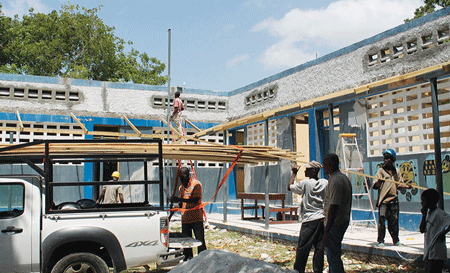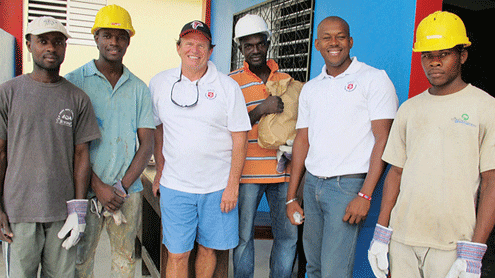
The Salvation Army continues to help in recovery three years after the devastating earthquake.
Partnering with the Haitian people, The Salvation Army has created a positive “ansanm, ansanm n’a rive” reputation in the three years since the magnitude 7.0 earthquake in 2010. In Haitian Creole, the phrase conveys the idea of working together to achieve a specific goal or task, which the Army’s Haiti Recovery and Development (HRD) office does with individuals, families and communities in an effort to rebuild.
For 60 years, The Salvation Army has been a mainstay in Port-au-Prince with the Delmas 2 compound, the headquarters and facilities site that was mostly destroyed in the earthquake. Construction on the new Delmas 2 complex began in August 2011, to include kindergarten, primary and secondary school buildings for College Verena, which is responsible for the education of more than 1,500 area children, and a church that will accommodate more than 500 attendees—the average guest count on any given Sunday.
The Salvation Army, Kindernothilfe (KNH) and donors in Germany, Canada, the U.S. and The Salvation Army World Service Office (SAWSO) joined Haitian firm ARCOTEC in the Delmas 2 construction project. The buildings on the compound will be both hurricane and earthquake resistant. The estimated completion date is February 2014.
“This is an architecturally and technically challenging project,” said Patrick Figaro, ARCOTEC CEO.
Tasked with managing the 2010 cholera outbreak, HRD immediately distributed soap, bleach, cleaning kits, water filters and building latrines. Although not eradicated, cholera incidences significantly dropped.
To support the socio-emotional development of children and adolescents who suffered loss and trauma, the Army partnered with psychologists and educational consultants to develop life-skills materials to promote self-worth, creativity and a sense of community. Approximately 1,000 young people in the Port-au-Prince metropolitan area and southern Haiti meet three days each week for recreational, cultural and educational activities.
Construction teams work non-stop to rebuild damaged schools outside the Port-au-Prince area. Currently, the team is working on the second—and largest—of four school groups with a completion target of December 2014.
As a component of Haiti’s School Infrastructure Support program, the Army trained a maintenance team that has already completed repairs and renovations at multiple sites. To promote community team building, it hired local labor and contractors to supplement its work force.
“We have learned more skills than when we started,” said Maxi, one local worker. “And we want to continue to work together with The Salvation Army.”
The Army in Haiti partnered with SAWSO to provide meals for children throughout the country.
Since 2011, the Army has provided more than 3.3 million meals to schools, clinics and other service centers, expecting the food to last until the end of the 2012-2013 school year. Meals were also distributed to pregnant mothers, sick children and other vulnerable populations.
Corps officers and community leaders in the west and south zones were equipped with faith-based facilitation and basic project development and management skills. Community Action Teams now have the tools to develop and implement projects to address needs in their communities and can apply for small grants for projects that promote sustainable change. To date, the Community Capacity Development project team has trained more than 140 people in The Salvation Army’s Building Deeper Relationships faith-based facilitation model with plans to expand the project into the north in the coming year.
The Integrated Family Support program (IFS), the most recent major community development project to be implemented by the HRD office, addresses the four direct service priorities identified by The Salvation Army Haiti: permanent housing, livelihood support, vocational training and agriculture. IFS will help increase the capacity of vulnerable families and individuals to respond to difficult economic and social circumstances.












